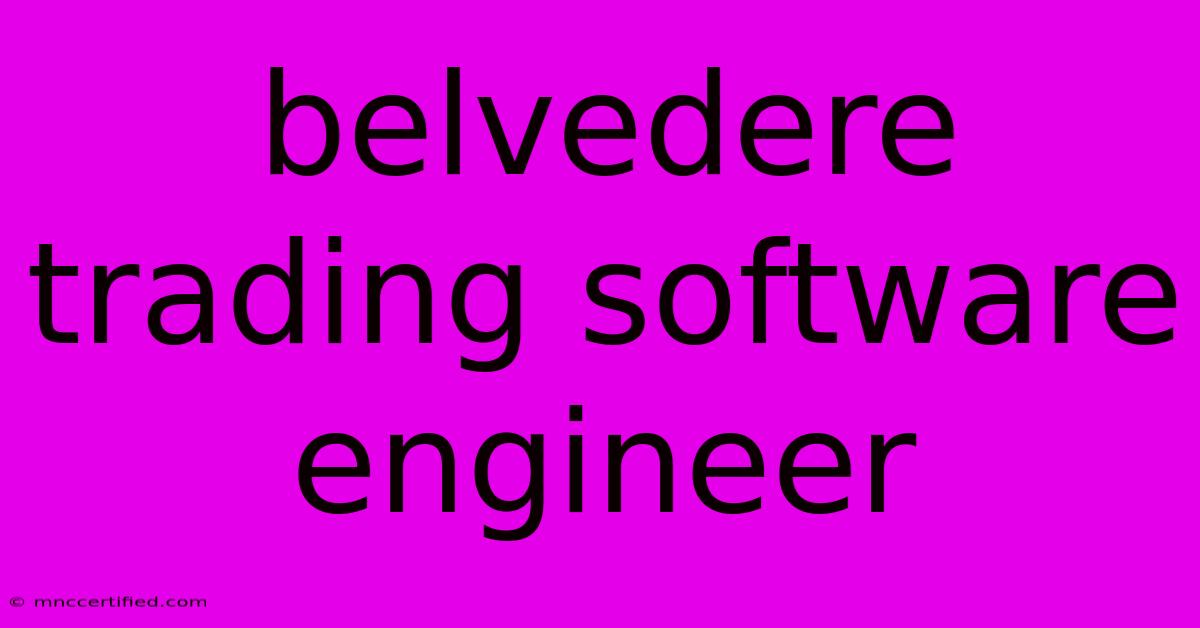Belvedere Trading Software Engineer

Table of Contents
Cracking the Code: What It Takes to Be a Belvedere Trading Software Engineer
The world of high-frequency trading is fast-paced, complex, and constantly evolving. Behind the scenes, a team of brilliant minds works tirelessly to build and maintain the sophisticated software that powers these lightning-fast transactions. If you're drawn to the challenge of pushing the boundaries of technology in the financial industry, then a career as a Belvedere Trading Software Engineer might be the perfect fit for you.
What Does a Belvedere Trading Software Engineer Do?
Belvedere Trading Software Engineers are responsible for the development, maintenance, and optimization of high-performance trading systems. This involves a wide range of tasks, including:
- Designing and implementing trading algorithms: These algorithms are the brains behind the trading process, analyzing market data and executing trades based on predefined rules.
- Building and managing trading infrastructure: This includes everything from servers and databases to network connections and security systems.
- Optimizing system performance: Ensuring that trading systems can handle massive volumes of data and execute trades with minimal latency.
- Working with traders and other stakeholders: Understanding their needs and translating them into technical solutions.
- Staying up-to-date on the latest technologies: The financial industry is constantly evolving, so engineers must be able to adapt to new challenges and embrace cutting-edge technologies.
Essential Skills for Belvedere Trading Software Engineers
To thrive in this demanding role, you need a strong foundation in computer science and a passion for problem-solving. Here are some key skills:
Technical Skills:
- Programming Languages: Proficiency in languages like C++, Java, Python, and C# is essential for building and maintaining trading systems.
- Data Structures and Algorithms: A deep understanding of data structures and algorithms is crucial for developing efficient and scalable trading software.
- Operating Systems: Knowledge of Linux and other operating systems is vital for managing trading infrastructure.
- Networking: Understanding networking concepts and protocols is necessary for building and maintaining secure and reliable trading systems.
- Databases: Proficiency in SQL and other database technologies is essential for managing and analyzing trading data.
Soft Skills:
- Communication: Excellent communication skills are essential for working effectively with traders, other engineers, and stakeholders.
- Problem-solving: You must be able to identify and solve complex technical problems quickly and efficiently.
- Attention to Detail: Accuracy and meticulousness are paramount in the fast-paced world of trading.
- Teamwork: Collaboration is crucial in the development of complex trading systems.
How to Become a Belvedere Trading Software Engineer
- Education: A Bachelor's degree in Computer Science or a related field is usually required. A Master's degree or a PhD can provide a competitive edge.
- Experience: Internships and entry-level roles in software development are valuable stepping stones.
- Continuous Learning: The financial technology landscape is constantly changing, so ongoing learning and development are essential. This can include certifications, attending workshops, and staying abreast of industry trends.
Why Choose a Career as a Belvedere Trading Software Engineer?
- Impact: You will be working on the cutting edge of financial technology, directly impacting the way markets function.
- Challenge: The work is intellectually stimulating and constantly evolving, offering opportunities to learn and grow.
- Rewarding: The industry offers competitive salaries and benefits.
- Fast-paced Environment: You'll be working in a dynamic and fast-paced environment, where every day presents new challenges and opportunities.
In conclusion, a career as a Belvedere Trading Software Engineer is a rewarding and challenging path for those with a passion for technology, a desire to push boundaries, and the drive to make a real impact in the financial industry.

Thank you for visiting our website wich cover about Belvedere Trading Software Engineer. We hope the information provided has been useful to you. Feel free to contact us if you have any questions or need further assistance. See you next time and dont miss to bookmark.
Featured Posts
-
Aquablation Cost Without Insurance
Nov 15, 2024
-
Bluesky App Key Features Explained
Nov 15, 2024
-
Cynthia Erivos Wicked Whistle Tune
Nov 15, 2024
-
Auction The Onion Wins Jones Media
Nov 15, 2024
-
Eva Longoria Family Leaves Dystopian Us
Nov 15, 2024